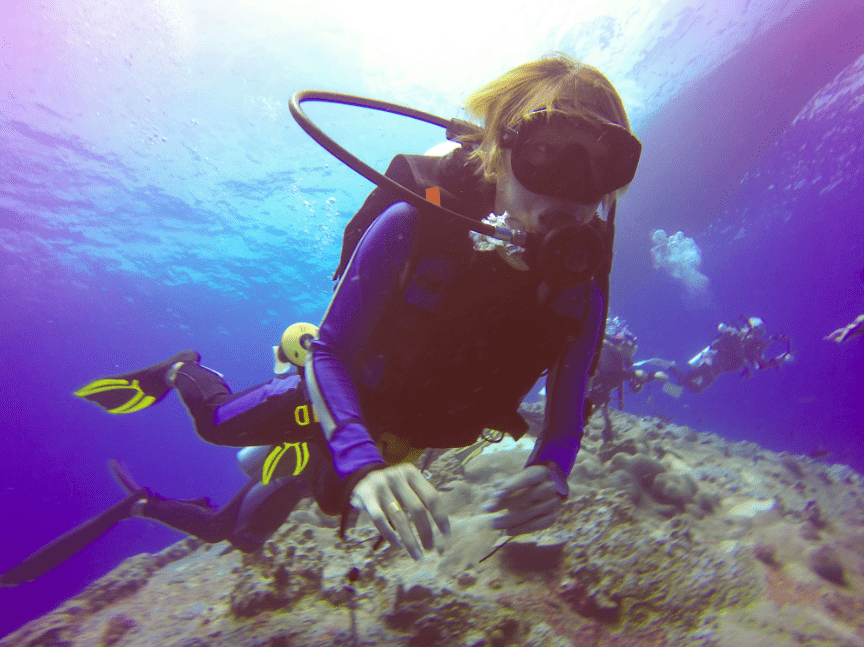*This post may contain affiliate links. As an Amazon Associate we earn from qualifying purchases.
According to the theory of evolution, we have long since lost the ability to breathe underwater when we lost our gills. As a result, scuba enthusiasts must use a diving tank and dive computer to experience the wonders found beneath the surface of the ocean.
However, the use of diving tanks for our temporary life underwater comes at a cost. Diving tanks are limited in their ability to provide us breathable air. We are permitted only so much time underwater. The ascent to land following our time in the water is fraught with danger in the form of decompression sickness (also known as the bends).
The deeper we dive into the unknown depths of the ocean, the greater the amount of nitrogen in our tanks being dissolved in the water that comprises our body. If you rise up from the watery depths too fast, the pressure changes exert the same effect as shaking a bottle of soda before opening it.
The human body is not equipped for such an event. This is an extremely painful experience and one that can be fatal. It is of vital importance to have the best gear during your underwater journey. Buying the right dive computer can literally be a matter of life and death.
The Importance of the Dive Computer
An incredibly important piece of equipment for all scuba divers is the dive computer. This handy piece of equipment can give users more safe bottom time than having to use diving tables to plan your journey. And, importantly, it is extremely valuable for avoiding the bends.
You need to ascend at the correct speed and take carefully calculated breaks (known as “decompression stops”) to safely ascend following your underwater experience. It is crucial that you allow enough time and air for this journey. If you don’t, the alternative is spending time in a decompression chamber and hoping for the best.

As important as this is, being surrounded by nature’s serene beauty makes it difficult to stay alert. It can be nearly impossible to focus on your depth and pressure, as well as managing the time required to ascend and remaining air. This is true for both experts and novice divers alike.
Dive computers make life simple. They perform all the complicated calculations automatically and allow you to concentrate on enjoying your diving experience. Dive computers perform required calculations far faster than is humanly possible and without the element of human error.
But it is important to select a reliable and convenient dive computer. Every scuba diver is different. Therefore, the perfect dive computer is different for everyone. With so many choices in the dive computer market, it can be overwhelming to choose what is best for you. There are some important questions you need to consider when purchasing your dive computer.
Types of Dive Computers
Dive computers offer a choice between the wrist or console styles. Each style of dive computer features its own set of advantages and disadvantages.
Wrist dive computers
Wrist dive computers are convenient in that all important data is accessible directly by looking at your wrist. This makes it easy to access all the important information quickly, and the location promotes the quick and easy reading of the information. Wrist computers come in two distinct styles.
First, the classic design of a wrist dive computer looks like you are wearing a hockey puck on your arm. These watches feature a wide readable screen, which is perfect for the novice diver.
Second, wrist dive computers can also look like a normal watch. This allows the user to wear the wrist computer in daily life, without getting strange looks from others. The watch style tends to be more expensive than the classic dive computer.
[amazon box=”B00Z6V5GPW” template=”horizontal”]
Console dive computers
Console dive computers offer an alternative to wrist computers. They attach directly to scuba equipment through a hose. The main advantage of the console dive computer is that they keep all scuba instruments together, which is a nice bonus for divers who prefer a more structured instrumentation set up.
[amazon box=”B000GHRGAO” template=”horizontal”]
Comparing wrist and console dive computers
Advantages of wrist dive computers include the increased popularity compared with console dive computers. This makes them easier to find in stores, easier to repair, and trendy to own. Second, some wrist computers resemble regular watches, which provides the possibility of everyday use. Also, wrist dive computers give you important information at a quick glance. This is handy, considering the ease of simply moving your eyes to look at one’s arm. As a result, wrist dive computers are easier to read underwater compared to console dive computers. Lastly, wrist dive computers come in rectangular shapes, which offer bigger display screens.
Console dive computers are the cheaper alternative to wrist console computers. For the budget conscious or novice diver, this can represent substantial savings when getting started. Top-end wrist dive computers cost more than a thousand dollars, which can be a huge obstacle for someone first experimenting with underwater adventure.
How to Choose the Right Dive Computer
There are many different styles and options in the dive computer market. This can be overwhelming to someone just starting out. Remember that all scuba divers are different, and what computer one diver loves might not be preferred by another. It is important that each scuba diver considers their own needs before committing a large sum of their hard earned cash on a piece of scuba diving equipment. This section describes the latest options available for dive computers to make a better-informed purchase decision.
Perform calculations
All dive computers assume the responsibility of calculations related to the diver’s time spent underwater. One of the basic calculations for a dive computer is to determine decompression. Decompression stops depend on the depth and duration of the dive. The dive computer must provide accurate guidance during this process. Some dive computers take this one step further. They can perform a revised decompression stop calculation in the case that a diver misses a decompression stop or ascends early (before a decompression stop was supposed to end).
Another feature offered by some dive computers includes the no-fly times that are vital for divers who rely on airplane travel to reach dive sites. As mentioned above, the body slowly releases nitrogen following a scuba dive. If nitrogen has not been removed before air travel, this remaining nitrogen in the body expands because of the lower pressure in the body during take-off. Remember that soda analogy? This is not good. But the no-fly calculation performed by your dive computer can prevent this potentially fatal situation by advising you when it is safe for air travel.
Backlighting
Many popular dive computers offer backlighting to allow divers to easily view the computer’s display without the need for a flashlight. Many divers consider this feature indispensable, and it should be a feature you strongly consider when choosing your dive computer.
Navigation
Knowing where you are relative to the boat or shore is a must for any scuba diver. Traditionally, they use a special compass to perform this function. But the best gear today incorporates the function of a compass into the dive computer, providing a digital display of this vital information. When considering your dive computer, this is something to keep in mind.
Depth gauge
The ability to perform a reading of your current depth has become more sophisticated with the development of dive computers. Traditionally, scuba divers measured the current depth using their depth gauge. Today, some dive computers can determine the time spent at varying depths — adding detail to the dive experience and enabling for better monitoring of dive fundamentals.
Memory
Dive computers vary in the number of dives they can store. Some dive computers only show the most recent dive, while many dive computers these days store more than 10 separate dives. This is another thing to consider when comparing dive computers.
Compatibility with PC/laptop
It is important for many that their dive computer is compatible with their personal computer. Many dive computers allow you to download dive details directly onto a PC. This is convenient in that it allows you to keep a permanent record of your dives. It is important to check not only that the PC is compatible with your dive computer, but also that there is adequate software available for you to take full advantage of the capabilities of your dive computer when transferring information to your PC.
Air integration
Wireless air integration is another factor to consider and is a trendy new development in dive computers. This allows you to effectively monitor your air consumption, the PSI reading of your dive tank, and the bottom time remaining. Some high-end models also enable you to monitor the remaining air of a group of divers, which may be valuable to expert divers who are responsible for the safety of those less experienced.
Choose the Dive Computer That Is Right for You
Choosing a dive computer that takes care of all the hard work makes for a more pleasurable dive experience. After all, we all go scuba diving to enjoy the experience of connecting with nature. So be sure to carefully consider the points discussed in this article to remove the hard work from your next dive. And enjoy your worry-free time exploring the wonders of the ocean’s depths.
[amazon box=”B00Z6V5GPW,B000GHRGAO,B001FWWGYA,B07KCRKFD8″ grid=”4″]
Featured image: CC0, by Pascal van de Vendel, via Unsplash

